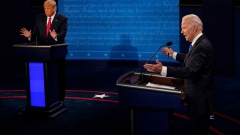Feb 12, 2020
Iowa Democratic Party Chairman Resigns After Caucus Debacle
, Bloomberg News
(Bloomberg) -- The chairman of the Iowa Democratic Party resigned Wednesday after overseeing a botched presidential caucus that led to days of confusion, chaos and anger as campaigns and voters waited for the final results, according to two people familiar with the decision.
Troy Price will be replaced by an interim chairman, state Representative Mark Smith.
Price’s departure comes more than a week after the Feb. 3 caucus and at a precarious time for the state party. Even as it is trying to resolve the caucus catastrophe, the party must gear up for a fight to protect Iowa’s status as the first-in-the-nation presidential nominating contest. The party didn’t immediately respond to a request for comment on Price’s departure.
The reporting of the results of this year’s caucus was marred from the beginning by problems with a smart-phone app that didn’t work and a backup telephone hotline that was jammed by calls from supporters of President Donald Trump.
On Wednesday, the party accepted partial recanvass requests from the campaigns of Bernie Sanders and Pete Buttigieg. That process is expected to begin on Sunday.
Sanders won the popular vote in Iowa but Buttigieg won two more delegates to the nominating convention this summer.
Sanders won the New Hampshire primary on Tuesday, with Buttigieg in close second. Buttigieg now has one more delegate than Sanders in the haul from the two states.
Price is a veteran Iowa political operative who was Hillary Clinton’s 2016 Iowa political director. He also served as the state party’s executive director during the 2014 cycle and worked for former Governors Tom Vilsack and Chet Culver.
Price became party chairman in 2017 just as a long-simmering controversy over the Democratic caucuses was intensifying. Critics say that caucuses -- a fixture of presidential politics in Iowa since 1972 -- make it harder for people to participate because voters have to show up for a lengthy session on a weeknight.
Those critiques were especially intense from Clinton supporters in 2016, when primary results favored her, but caucuses tilted toward her opponent Bernie Sanders. In an overhaul of the Democratic National Committee rules that followed that election, both camps agreed to changes that required better accessibility from state parties that wanted to hold caucuses in 2020.
The Iowa Democratic Party proposed hosting virtual caucuses, where voters could participate through teleconferencing. The national party raised substantial cybersecurity concerns at the party’s summer meeting in San Francisco, foiling the plan and forcing the state party to come up with an alternative. Iowa Democrats and leaders from other states that planned to hold caucuses in 2020 complained they were being forced to comply with DNC rules without any assistance from the party.
The state party devised satellite caucuses, which allowed Iowa voters who were elsewhere in the U.S. and abroad to participate.
(Disclaimer: Michael Bloomberg is also seeking the Democratic presidential nomination. He is the founder and majority owner of Bloomberg LP, the parent company of Bloomberg News.)
To contact the reporters on this story: Tyler Pager in Manchester, New Hampshire at tpager1@bloomberg.net;Jennifer Epstein in Manchester, New Hampshire at jepstein32@bloomberg.net
To contact the editors responsible for this story: Wendy Benjaminson at wbenjaminson@bloomberg.net, Kevin Whitelaw
©2020 Bloomberg L.P.







